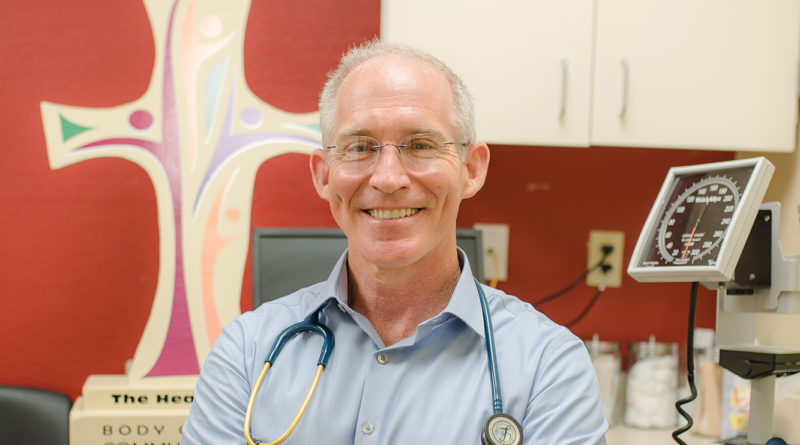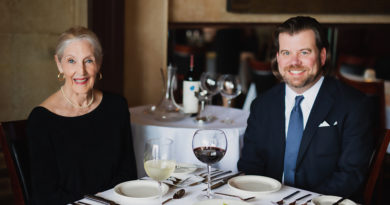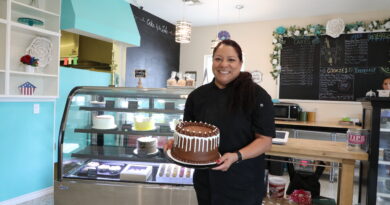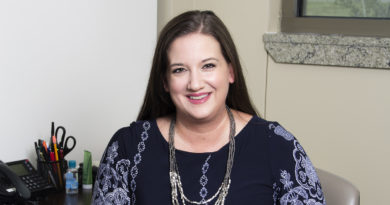Miracles do happen
Dr. Ligon puts faith into practice at Body of Christ Community Clinic
By Stacy Moser
Photography by Justin Borja
Dr. Billy Ligon says he’s no stranger to witnessing miracles. For him, they mostly seem to happen on Thursday nights, when he volunteers as the medical director at the Body of Christ Community Clinic in Belton.
“I’ll have a long day at work at my day job and I’ll be tired, but I come in here on Thursday night and, at the end of my shift, I leave so energized. As a physician, you help people all day, but here I get to help people who don’t have healthcare access, and that’s just all the more special. That’s really the miracle for me.”
He was a reluctant participant in starting the free clinic back in 2008, when he was a busy Baylor Scott & White Salado Family Medicine Clinic director and father to three teenagers, raising them with his wife, Melissa.
“The Belton High School assistant principal, Herb Cox, was seeing a lot of students struggle with their school work due to absences from illnesses and medical problems,” Billy explains. “Many of their families didn’t have sufficient access to healthcare. So Herb talked to the pastor of First Baptist Church in Belton, Andy Davis, about the problem.”
The solution, according to a committee formed within the community, was to build a clinic in Belton to address the underserved population and help families stay healthy, enabling their kids to succeed in school.
“Andy approached me about getting this clinic project started and my response was, “Ehhh … I’m super busy,” Billy smiles. “I said, ‘I’ll be happy to volunteer when you all get that going.’ I didn’t think I could spare time for it. But I got sucked in!” he laughs. “And I’m so glad I did.
“We had no idea how to establish this clinic, what to do or how to do it. And God just—boom—laid it out for us. We’d worry about what to do next and—boom—there was a solution. For instance, Helping Hands Ministry donated a portion of this building for the clinic. This whole place, all the computers, medical equipment, cabinetry, countertops, everything you see here, there was no fundraising. It just happened. People heard about it and came to donate things and help out. As word of mouth spread, God provided. It’s been a miracle.”
Now, the clinic is open on Tuesday mornings and Thursday evenings to provide basic healthcare services to the underserved population in the Belton and Salado area. The clinic is supported by 15 local churches. More than 100 volunteers serve there on a regular basis, including at a dental clinic recently established nearby. “We care for people who are affected by diabetes, hypertension, asthma or even heart disease,” he says. “Patients can see counselors here or talk to social workers who help them find other resources in the community. We’re not an emergency room, though, and we’ll send people to the ER if they need urgent care.
“While we got this running, I was the director at the Baylor Scott & White Salado Clinic, too, where I’ve been practicing for 10 years. People don’t really know how much that hospital system does for people. They run a lot of lab tests for us for free, for example. I’m impressed and proud to be part of their team and what they have done for people who can’t afford healthcare.”
When asked about the journey that lead him to the field of medicine, he explains that he was the first from his family to attend college and he wasn’t sure how he would afford medical school. “I was just a poor country boy—I didn’t know how I was ever going to do it. When I graduated from college, my father-in-law, who was active-duty Air Force, suggested that I talk to a military recruiter.”
Billy took advantage of the Air Force’s health profession scholarship program, attending medical school at Baylor University School of Medicine in Houston and then working off his tuition by serving as a flight surgeon for a C-130 transport crew in the 772nd Air Lift Squadron. “That was an exciting time for me. I saw patients while wearing a flight suit, like in a Tom Cruise movie,” he reminisces, chuckling. “We’d get on a plane and fly somewhere in the desert of the Middle East and I’d think, ‘What in the world am I doing here?’ During that time, Scud missiles were whizzing overhead.”
He reflects on his time as a flight surgeon during Operation Desert Storm, “Without a doubt, I think you grow through seeing hard things, like I did during those years. You work through hard situations and, as a physician, you hope to affect people, but they end up affecting you.” He says that those experiences taught him how lucky he was when he returned to civilian life.
This summer, Billy stepped down from his administrative role at the Baylor Scott & White Clinic in Salado, concentrating on his full-time medical practice there, just in time to see his youngest child, Chet, off to college. “We have three kids—Trevor, who’s 28 and a physical therapist; Kelley, who’s 26 and a missionary; and Chet, who’s 19.
Back when Trevor and Kelley were getting older, Melissa and I thought, ‘They’re getting so big!’ So we had our just-for-fun kid, and that’s Chet.
“In August, Melissa and I dropped Chet off at college. We took a trip right afterward, but we came home and, that first night back, we both broke into tears,” he says wistfully. “We’re not sad, though. We’re happy—it’s joyful, it’s a blessing. We decided we don’t like the term ‘empty nest’ because we’re not empty, we’re free birds. Now we come home at the end of the day and say, ‘Hey, it’s just you and me!’ Like a lot of our friends, we’re ‘dating’ each other and having a lot of fun.”
Billy ponders the future mission of the Body of Christ Community Clinic and becomes animated when he discusses a new project that’s near and dear to his heart.
“Diabetes is the number-one cause of blindness in America,” he states. “Poorly controlled diabetes affects the blood vessels of the eye. If you don’t diagnose and treat that, a patient may be at risk for progressive vision loss. Right now, at the clinic, we don’t have a dependable way to screen for diabetic retinopathy. So we’re looking at acquiring equipment that can monitor changes at the retinal arteries so an ophthalmologist can recommend early therapy. The exciting thing for me personally is that my wife also wants to volunteer and be part of this project.
“I have no doubt that, just like when this clinic was built, we shouldn’t stress about where we’ll find the resources for the new equipment—we’re just praying about it. We have the idea and we’ll take that first step, take the second step, then something wonderful will happen. We have faith.”




